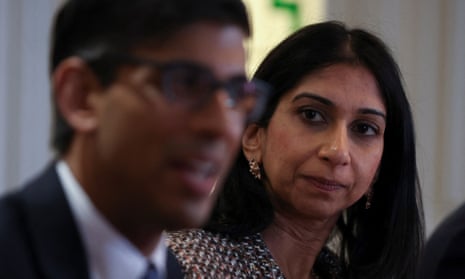Politicians who make “inaccurate or divisive claims” about child sexual abuse and grooming gangs undermine efforts to tackle the crime and almost certainly make children less safe, organisations and experts in the subject have warned in an unprecedented joint letter.
The letter, signed by 50 researchers and more than a dozen organisations, including the NSPCC and Victim Support, urges Suella Braverman and Rishi Sunak to avoid narratives on abuse based on “misinformation, racism and division”.
It follows much-criticised comments by Braverman, the home secretary, who has repeatedly characterised so-called grooming gangs targeting vulnerable girls as a predominantly British-Pakistani problem, one based on different “cultural values”.
The letter, which notes that the Home Office’s own research has contradicted Braverman’s views, calls for an evidence-based response in the light of the government-commissioned independent inquiry into child sexual abuse, or IICSA, rather than one based on “short-term media cycles”.
“To this end, we urgently ask all politicians to refrain from making partial, inaccurate or divisive claims about child sexual abuse. Doing so undermines attempts to ensure policymaking is evidence-based, fair and inclusive,” it said.
“Many recent political announcements and accompanying media discussions have clearly fallen short in this regard, perpetuating misinformation, racism and division.”
The letter, sent to Sunak and Braverman on Thursday, warned that placing “a singular focus on groups of male abusers of British-Pakistani origin draws attention away from so many other sources of harm”.
It added: “Whatever the intention behind these partial narratives, children will almost certainly be less safe as a result.”
A Home Office report in 2020 on group-based child sexual exploitation found that the majority of offenders were young white men, and that it was not possible to conclude whether any particular ethnic group was disproportionately represented.
Despite this, Braverman has said “almost all” members of grooming gangs, a term itself seen by many child protection professionals as legally meaningless and tainted by racism, are British-Pakistani men, a view not contradicted by Downing Street.
The joint letter, however, stressed that children “are sexually abused across all strata of society and in every type of institution”, including families, schools, clubs, religious institutions and the criminal justice system.
“Policies which start from a basis of singling out one ‘type’ of abuse as more heinous and worthy of attention than any other are ineffective and unethical,” it said.
“For example, a narrow focus on the perceived targeting of white girls overlooks the equally reprehensible victimisation of boys and young men, and victims from Black and minoritised communities. Evidence also shows significantly under recognised abuse amongst disabled children.
“Overlooking and/or misrepresenting the sheer scale and varied nature of child sexual abuse, however unintentional, is dangerous. It inhibits timely recognition, hampers effective responses and weakens the societal fabric necessary to keep children safe.”
after newsletter promotion
The letter, which was also signed by the chief executive of the NWG Network, which represents thousands of professionals working on child sexual exploitation, was organised by three academics: Helen Beckett and Camille Warrington from the Safer Young Lives Research Centre at Bedfordshire University; and Ella Cockbain, associate professor of crime science at University College London.
It calls for a new approach from government to tackling the issue after the IICSA report, including challenging the “silencing and stigma” attached to abuse, and associated victim blaming, as well as a regular national prevalence survey and investment in prevention work.
Other measures include better access to support, a “responsive criminal justice system” and more awareness of the subject in schools and across society more widely.
“This government – and any future government committed to tackling child sexual abuse – must do better to ensure no child is unseen or left behind,” the signatories wrote.
“That means acting on the existing evidence base, listening to the expertise of victims, survivors and professionals, and prioritising meaningful impact over short-term media cycles. Children deserve nothing less.”
Asked if Downing Street supported Braverman’s language over the issue, Sunak’s deputy spokesman declined to say, and added: “I’m not going to go back over comments from a while ago. I think we responded to those at the time.”
The Home Office was contacted for comment, and responded by pointing to a planned new compensation scheme for survivors of child sexual abuse. A representative for Braverman said they had no comment.
